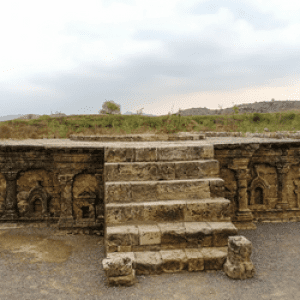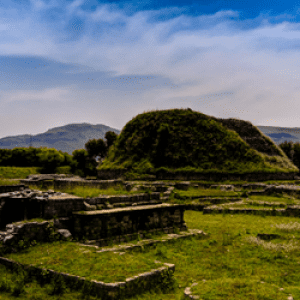1 day
Daily Tour
1 person
English
Explore the traces of Ancient Buddhist Civilization, a lively community dating back 2000 years ago. Due to its historical significance within the Buddhist Community, Taxila heritage was declared a UNESCO world heritage site in 1980. The Taxila Museum is one of the living examples of Buddhist Civilization. The Guardian Newspaper declared Taxila heritage as the top tourist destination in 2006. The tour involves various archeological sites of the Gandhara Civilization. The sites include Mohra Moradu, Dharmarajika, Sirkap and Jaulian. Jaulian was the oldest Buddhist university.
Taxila counts in the list of world heritage sites that have been great tourist attractions worldwide. Tourists from different countries visit Pakistan and explore Buddhist Civilization by mainly visiting the Taxila Heritage Site.
Nestled in the heart of Pakistan, the ancient city of Taxila stands as a testament to the rich historical and cultural tapestry of the region. This UNESCO World Heritage Site, located just 35 kilometers northwest of Islamabad, is an archaeological marvel that offers a profound glimpse into the Gandhara Civilization that flourished here more than two millennia ago. At the heart of Taxila’s cultural heritage lies the Taxila Museum, a repository of the region’s ancient wonders, and the surrounding heritage sites that echo with the footprints of time.
Taxila Museum, inaugurated in 1928, is a treasure trove of Gandhara’s glorious past. It houses a remarkable collection of artifacts, sculptures, and relics dating back to the Gandhara Civilization, which thrived here between the 6th century BCE and the 5th century CE. This museum stands as a bridge connecting the modern world to an ancient era, preserving and showcasing the artistic and cultural achievements of the Gandharan people.
The Taxila Museum is a testament to the exquisite artistry of the Gandhara region. Its galleries are adorned with intricately carved Buddha statues, Buddhist stupas, friezes, and decorative panels. These sculptures are characterized by a unique fusion of Hellenistic, Indian, and Persian artistic influences, reflecting the cosmopolitan nature of the Gandhara Civilization.
Taxila Museum plays a pivotal role in preserving the region’s heritage. Its conservation efforts are commendable, ensuring that future generations can continue to appreciate the cultural wealth it safeguards. Educational programs and guided tours further enhance visitors’ understanding of the historical significance of Taxila and its artifacts.
Beyond the museum’s walls, the Taxila Archaeological Complex unfolds, featuring an array of heritage sites that transport visitors back in time. This sprawling complex is divided into three main areas: the eastern city, the western city, and the Dharmarajika Stupa area.
Eastern City
The eastern city boasts the ruins of the ancient Taxila University, a revered center of learning that attracted scholars from far and wide. The remnants of monasteries and stupas add to the aura of intellectual pursuit that once thrived here.
Western City
The western city reveals the former residential and administrative areas of Taxila. Exploring this region, you can witness the layout of ancient streets and houses, offering insights into the daily life of the Gandharan people. The ruins of the Sirkap city, complete with a Greek-style layout, are particularly fascinating.
At the Dharmarajika Stupa area, you’ll encounter the awe-inspiring Dharmarajika Stupa itself, along with the stunning Buddhist sculptures that adorn its base. The stupa, believed to house relics of Buddha, is surrounded by exquisite reliefs that narrate the life of the Enlightened One.
Located a short distance from the Taxila Museum, the Jaulian and Mohra Moradu Monasteries are well-preserved examples of Buddhist monastic complexes. These monasteries once served as centers of meditation and spiritual learning and feature intricately decorated stupas and chambers.
Sirsukh and Badalpur Monasteries are two more significant sites in the Taxila region. These monasteries, with their ornate Buddhist sculptures and remnants of living quarters, provide further insight into the Gandhara way of life.
Explore the beauty of Buddhist Civilization with Gypsy Traces and Tours and make your trip memorable.


Our tour guide will give you a detailed insight into Gandhara/Buddhist Civilization. Before visiting the archeological sites, you will be briefed about them. The museum has preserved Buddhist arts and crafts. You will also witness the relics of Lord Buddha. Duration: 1 Hour 30 Mins Tickets: Included
Dharmarajika Stupa is considered one of the 10th biggest stupas in South Asia. It was the oldest and largest religious complex of the Gandhara Civilization. King Ashoka constructed the monastery to keep the holy relic of lord Buddha. Some relics are preserved at the site. However, most of the relics have been moved to the Taxila Museum. Duration: 1 Hour Tickets: Included
Sirkap is the oldest planned town of the Buddhists. Interestingly today’s modern Islamabad is also planned according to the oldest Buddhist city, Sirkap. Sirkap archeological site is 30% excavated, and the remaining part is still unexplored. Duration: 1 Hour Tickets: Included
One of the Gandhara/Budhist civilization's rich and well-preserved archeological sites is the Jaulian Buddhist Monastery. You will witness the votive stupa, the monastery ruins, the healing buddha, and some relics associated with the lord Buddha. Jaulian is also known as the center of wisdom and education because Buddhist monks worldwide visited Jauliian for education and enlightenment. Duration: 1 Hour 30 Mins Tickets: Included After visiting the ancient Buddhist Sites of Taxila Heritage, our team will take you back to your hotels.
Gypsy Traces & Tours can provide you with a Visa Invitation letter and supporting documents to the traveler who confirms his/her tour with us. You can apply online for a Pakistan visa at: https://visa.nadra.gov.pk/.
Yes, it is safe to visit Pakistan. The places in the tour mentioned are safe for females, families, and businesspersons. You will witness women's empowerment, sports, education, and culture.
Pretty! This was a really wonderful post. Thank you for your provided information.https://www.droversointeru.com